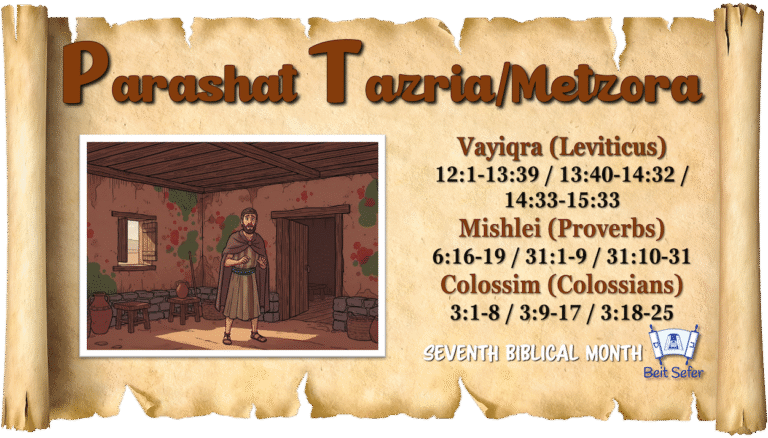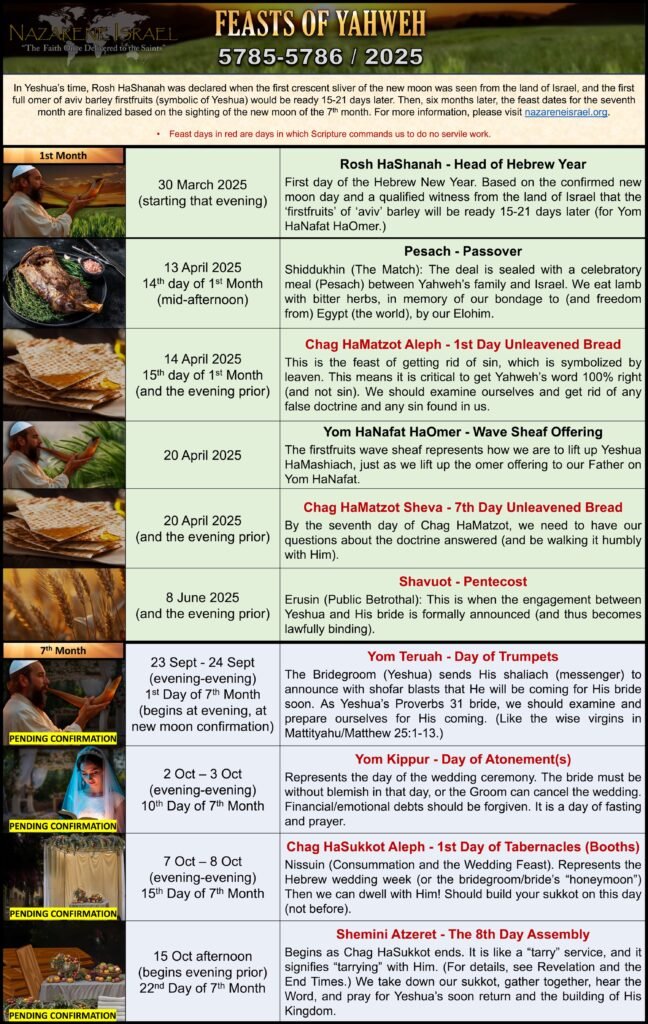Parashat Tazria / Metzora – Year 3 – The Heart in the Home.
Shabbat Shalom, Nazarene family.
This week we will study the parashat Tazria / Metzora, portion of year 3, where we will see how Yahweh taught His people to maintain purity in their homes and bodies. We will learn what to do when a house had suspicious stains and how priests were to inspect it. We will also read instructions on cleansing after certain illnesses and bodily conditions that required special care. We will see that these rules helped keep the community healthy and reminded them that Yahweh is Set-Apart. We will learn that obedience and cleanliness were important for living close to Him and in peace with others.
Vayiqra (Leviticus) 14:34-36
34″When you have come into the land of Canaan, which I give you as a possession, and I put the leprous plague in a house in the land of your possession,
35 and he who owns the house comes and tells the priest, saying, ‘It seems to me that there is some plague in the house,’
36 then the priest shall command that they empty the house, before the priest goes into it to examine the plague, that all that is in the house may not be made unclean; and afterward the priest shall go in to examine the house.
This week corresponds to the reading of the texts (in bold):
- Vayiqra (Leviticus) 12:1-13:39 / 13:40-14:32 / 14:33-15:33
- Mishlei (Proverbs) 6:16-19 / 31:1-9 / 31:10-31
- Colossim (Colossians) 3:1-8 / 3:9-17 / 3:18-25
Summary of the weekly study, Year three:
Vayiqra (Leviticus) 14:33-15:33
In these verses, we see that Yahweh taught His people to maintain purity both in their homes and in their own bodies. It discusses how priests were to inspect houses with blemishes and decide whether they needed to be cleansed or even torn down. Instructions are also given on cleansing after illnesses and bodily discharges that could render someone unclean. All of this shows that purity was not only physical, but also spiritual, reminding us that Yahweh is Set-Apart and desires His people to live apart from sin. In this passage, we learn the importance of Set-apartness.
Mishlei (Proverbs) 31:10-31
In these verses, we see a description of a virtuous, valuable, and trustworthy woman. Her dedication to caring for her family, her diligence at work, and her generosity to those in need are highlighted. We learn that her true strength lies in her fear of Yahweh, rather than in her outward beauty. She is wise, organized, and forward-thinking, and her family honors her for all she does. This passage shows that true excellence lies in character and faith. In this passage, we learn that virtue and respect for Yahweh are the greatest treasures.
Colossim (Colossians) 3:18-25
In these verses, we see instructions for family and work life that honor Yahweh. It talks about the relationship between wives and husbands, encouraging mutual respect and love. Children are also guided to obey their parents, and parents are guided not to discourage their children. Servants are mentioned, teaching them to work sincerely, as for the Master in heaven, not just to please men. Everything emphasizes that our actions should reflect our faith. In this passage, we learn to live with respect, love, and obedience to Yahweh.
–
Enjoy this fun activity with the whole family. Inside you will find development questions for the three weekly sections (Torah, Haftarah and Brit Chadasha). While the older ones discuss the questions and their answers, the younger ones can color the picture related to the teaching, solve a maze, find the 7 differences and much more. We encourage you to do it week by week and instill in your children the habit of studying Yahweh’s word as a family.
We hope you and especially your sons and daughters enjoy this effort. For it is through the study of the Scriptures that we can come to understand the love and care that Yahweh has always had for us. And also to perceive that He has been taking care of even the smallest detail, so that we can take care and enjoy all that He gives us. That is why it is so important that our children learn and grow up knowing that they are loved by the Creator of all that exists.
Shalom.
To view the Tanach studies, click here
To view the Brit Chadasha studies, click here




